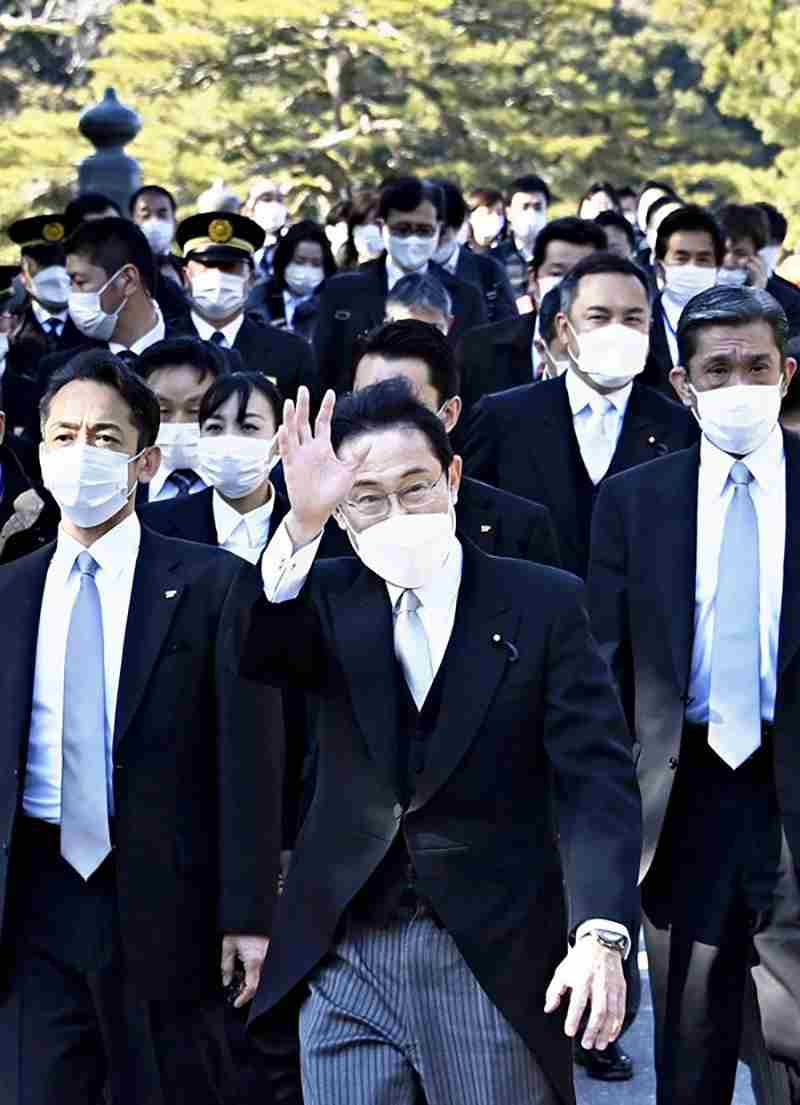
Prime Minister Fumio Kishida visits Ise Jingu Shrine in Ise, Mie Prefecture, on Tuesday.
16:05 JST, January 5, 2022
Prime Minister Fumio Kishida stressed his intention to implement all possible measures against the novel coronavirus in his first press conference of the year, recognizing that the administration’s handling of the pandemic will influence the outcome of the House of Councilors election this summer.
“We will also be prepared for a worst-case scenario of community-acquired infections’ spreading rapidly,” Kishida said on Tuesday, announcing a shift in policy from one of containing the spread of infections to preventing such situations as the collapse of medical services in anticipation of a possible increase in the number of COVID-19 patients.
Since Japan logged its first omicron case in late November, the government has implemented strict border-control measures. Thanks to such efforts, the number of daily confirmed coronavirus cases has been held down to levels much lower than those seen in the United States or the Britain.
However, community-acquired infections have now spread to more than 15 prefectures, including Tokyo, and fears of a possible sixth wave of infections have been rising.
The government announced a policy of isolating all omicron patients in hospitals, but since December, the Health, Labor and Welfare Ministry and public health experts have said the policy should be changed because they were worried that it would put a strain on medical services.
Kishida, who has been eager to roll out tough measures so far, was initially reluctant to relax the government policy. On Monday, the prime minister discussed pandemic measures with health minister Shigeyuki Goto, Daishiro Yamagiwa, minister in charge of economic revitalization, and Noriko Horiuchi, minister in charge of promoting vaccinations.
Kishida agreed to change the policy of isolating all omicron patients in hosptals on the condition that arrangements would be in place for patients to receive medical treatment at home, including the preparation of oral antiviral drugs and pulse oximeters, a device to measure oxygen levels in blood.
First 3 months
Three months have passed since the Kishida Cabinet was inaugurated.
The Cabinet approval rating was as low as 56% at the start of his administration but had risen to 62% last month, according to a Yomiuri Shimbun survey.
The fact that the number of daily coronavirus cases stayed low likely helped his Cabinet get off to a smooth start. With the upper house election slated for this summer in mind, the Cabinet must strive to maintain high approval ratings.
Before the press conference on Tuesday, Kishida visited Ise Jingu Shrine where he prayed for an end to the pandemic. An official close to the prime minister said: “The fate of the Cabinet will also depend on whether we can contain the pandemic.
Balancing act
Since Kishida took office last autumn, he has vowed to “bolster diplomacy, starting with the United States,” aiming to hold in-person talks with U.S. President Joe Biden as soon as possible, but the global spread of the omicron variant forced a change of plans.
At the press conference Tuesday, Kishida said, “To enhance cooperation among Japan, the United States, Australia, and India, I will exchange opinions closely at the summit level.” With an eye on China’s economic and military rise, he stressed his intention to reinforce coordinated efforts among the four countries in the security forum dubbed the Quad.
When the Diet session is convened, it is likely to be difficult for Kishida to travel abroad until the budget for the new fiscal year is passed, so the administration intends to make use of online talks among other opportunities.
The prime minister’s emphasis on strengthening ties with the Quad is also a way to make progress with China, the biggest diplomatic challenge of the year.
In September, Japan and China will mark the 50th anniversary of the normalization of diplomatic ties.
Kishida said he aims to “build constructive and stable relations between Japan and China.” However, Beijing’s crackdown on human rights and provocative actions around the Senkaku Islands in Okinawa Prefecture have continued.
The prime minister will need to perform a balancing act to improve bilateral ties with Beijing, taking public sentiment in Japan into consideration, together with concerted efforts among allies and friendly nations.
Top Articles in Politics
-

Japan PM Takaichi’s Cabinet Resigns en Masse
-

Sanae Takaichi Elected Prime Minister of Japan; Keeps All Cabinet Appointees from Previous Term
-

Japan’s Govt to Submit Road Map for Growth Strategy in March, PM Takaichi to Announce in Upcoming Policy Speech
-

LDP Wins Historic Landslide Victory
-

LDP Wins Landslide Victory, Secures Single-party Majority; Ruling Coalition with JIP Poised to Secure Over 300 seats (UPDATE 1)
JN ACCESS RANKING
-

Japan PM Takaichi’s Cabinet Resigns en Masse
-

Japan Institute to Use Domestic Commercial Optical Lattice Clock to Set Japan Standard Time
-

Israeli Ambassador to Japan Speaks about Japan’s Role in the Reconstruction of Gaza
-

Man Infected with Measles Reportedly Dined at Restaurant in Tokyo Station
-

Videos Plagiarized, Reposted with False Subtitles Claiming ‘Ryukyu Belongs to China’; Anti-China False Information Also Posted in Japan





















